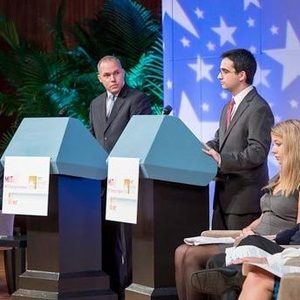Obama, Romney reps debate energy and climate policy




MIT Energy Initiative, Justin Knight
October 10, 2012
BY Luke Geiver
Representatives from both President Barack Obama and candidate Gov. Mitt Romney took the stage recently for a debate on each candidate’s position on energy and climate change. The event, MIT Energy Initiative’s Presidential Energy Debate, brought together Joseph Aldy, representing Obama, and Oren Cass, representing Romney, to discuss the future of federal energy policy, unconventional oil and gas and climate policy.
Aldy is on the faculty at the Harvard Kennedy School, a fellow for Resources for the Future and a fellow at the National Bureau of Economic Research. In 2009 and 2010, Aldy served as a special assistant to the president on energy and environment. Cass acts as Romney’s domestic policy director, advising him on energy, environment, health care, trade, labor, regulation and technology. Like Romney, Cass previously worked for Bain & Co., as a consultant.
The debate lasted roughly 30 minutes and featured questions on topics including: liquid natural gas export policy, renewable energy subsidies, oil pipeline infrastructure and other topics related to environmental issues like the Clean Air Act or greenhouse gas regulations. Aldy noted early in the debate that, “The president’s approach (on energy) has focused on an all of the above strategy. The president has supported the development of all energy resources, oil and gas, coal, nuclear, wind, solar and biofuels.”
In contrast to Aldy’s statement on Obama’s energy strategy, Cass painted a different plan for Romney, highlighting Romney’s support of energy independence through fossil fuel-based energy development in the U.S., spurred on by new oil and shale gas recovery methods. During the debate, Cass did not reference biofuels or biobased power, noting at one point, “there is no evidence, frankly, that the sorts of investments the president is making in green energy are superior to using the far more economically effective energy technologies we already have available.”
Advertisement
Advertisement
Aldy explained why the Obama administration has worked to push renewable energy subsidies and invested in the U.S. DOE and ARPA-E, adding that the president is still in favor of cutting subsidies to oil and gas. Aldy said that Romney “seems completely comfortable with what is an indefinite extension of the subsidies for oil and gas.” Later in the debate Aldy brought up the subject again.
“I think it’s important that there’s some who say, let’s just have a level playing field. Let’s get rid of all the subsidies. Now when you are doing that, you may say, hey, we don’t want to pick winners, but you are picking winners. First, those who have benefited by subsidies for an incredibly long time, the incumbents in the fossil fuels that have benefited from subsidies for, in the case of oil, nearly a century, they’re winners. They’ve become established, and they will actually benefit if you got rid of all of these.”
In response, Cass said that Romney believes that in the context of fundamental tax reform, “he absolutely thinks that the $2.8 billion in subsidies (to oil and gas) should be on the table. What he does not support is without tax reform, simply for political purposes, finding what sounds like an unpopular provision of the tax code.”
Advertisement
Advertisement
On the issue of climate change and greenhouse gas regulations, neither representative offered a definitive indication as to what each presidential candidate believes should be done in terms of federal policy. Aldy said Obama has been stifled by Congress in his attempts to pass legislation that would address climate change. Cass said that although Romney believes there are climate change issues currently happening, he would not support unilateral action by the U.S. and that with respect to a legislative agenda, “climate change would not be at the top of it.”
To conclude the debate, each presidential representative explained the differences each candidate has on the energy and climate topics discussed. For Cass, the biggest difference was the method each potential president would use to promote innovation. For Aldy, he reiterated the President’s support of an all-encompassing energy policy. “Let’s not just sort of focus on fossil fuels. Let’s say we can do a lot in the renewables, whether it is for biofuels, its wind, its solar.”
To watch the debate in its entirety, or to read the transcript of the event, click here.
Related Stories
The U.S. Department of Energy Bioenergy Technologies Office (BETO) announced up to $23 million in funding to support research and development (R&D) of domestic chemicals and fuels from biomass and waste resources.
The U.S. DOE has announced its intent to issue funding to support high-impact research and development (R&D) projects in two priority areas: sustainable propane and renewable chemicals and algal system cultivation and preprocessing.
Sens. Sherrod Brown, D-Ohio, and Pete Ricketts, R-Neb., in August introduced the Renewable Chemicals Act, a bill that aims to create a tax credit to support the production of biobased chemicals.
The Chemical Catalysis for Bioenergy Consortium, a consortium of the U.S. DOE’s Bioenergy Technologies Office, has launched an effort that aims to gather community input on the development of new biomass processing facilities.
USDA on March 8 celebrated the second annual National Biobased Products Day, a celebration to raise public awareness of biobased products, their benefits and their contributions to the U.S. economy and rural communities.
Upcoming Events










